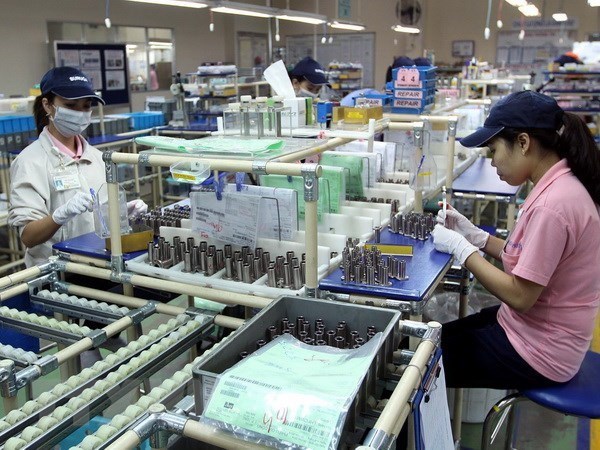Vietnam toward goal of becoming world’s manufacturing hub
The United Nations Industrial Development Organization (UNIDO) recorded Vietnam climbing two places in its Competitive Industrial Performance (CIP) Index as part of its recent report.
 Producing mechanic components at Misumi Vietnam company at the Linh Trung export processing zone & industrial park in Ho Chi Minh City’s Thu Duc district (Photo: VNA)
Producing mechanic components at Misumi Vietnam company at the Linh Trung export processing zone & industrial park in Ho Chi Minh City’s Thu Duc district (Photo: VNA)Hanoi (VNA) – The United Nations Industrial Development Organization (UNIDO) recorded Vietnam climbing two places in its Competitive Industrial Performance (CIP) Index as part of its recent report.
In the 2020 edition of the UNIDO’s CIP Index, the Southeast Asian country ranked 38th among 152 countries in 2018, compared to its 41st position in the previous year.
The Singaporean-based futureiot.tech site, in a recent article that discussed the index, said over the last 15 years, Vietnam has emerged as a strong manufacturing hub in Asia Pacific.
Accordingly, the report noted that Vietnam has been in an upward trajectory in terms of CIP since 1990. Vietnam was going above world average in terms of competitiveness, particularly with the country’s manufactured goods accounting for nearly 90 percent of the national exports, way ahead of the global average of 60 percent.
However, the country’s ranking in terms of the share of medium and high-tech activities in manufacturing has shown signs of a slowdown, moving down one notch to be placed at 40th in 2018. Its global ranking regarding the share of medium and high-tech activities in total manufacturing value added index only climbed a place higher to reach 31st in 2018.
Pressing ahead with industrialisation
In September this year, the Vietnamese government issued an action plan implementing Resolution No 23/NQ/TW, which sets out a national industrial policy by 2030, with a vision towards 2045. The action plan is designed to put Vietnam in the top three industrialised economies among 10 ASEAN member states.
As such, by 2030, the industrial sector is targeted to account for over 40 percent of the nation’s gross domestic product (GDP), with the value proportion of high-tech products from processing and manufacturing industries reaching at least 45 percent.
The average annual growth rate of industrial added value will be over 8.5 percent, in which that of the processing and manufacturing industries will constitute 10 percent.
The proportion of labour in the industrial and service sectors will surpass 70 percent, and a number of large-scale, multinational and globally competitive industrial clusters and industrial enterprises will be developed.
The action plan stipulates the introduction of policies to develop priority industries and create favourable environment for business opportunities and talent cultivation, using science and technology to spur industrialisation while keeping an eye on environmental protection and improving the ability to adapt to climate change.
Concentrating on the 4th Industrial Revolution (Industry 4.0)
The 4th Industrial Revolution introduces technologies such as big data, cloud, Internet of Things (IoT) and promises to optimise production. The first steps of Vietnam in digital revolution are already underway.
Polices on the development of infrastructure, creativeness, human resources, and priority sectors and technologies are already in place to realize the country’s ambition to be among the top Southeast Asian nations in the Global Innovation Index (GII) ranking.
In 2019, the Ministry of Planning and Investment released the draft national strategy on Industry 4.0 and developed a national programme to transform Vietnam into a digital society by the next decade.
On June 3, 2020, Prime Minister Nguyen Xuan Phuc approved the national digital transformation programme to 2025 and 2020 was selected to be the year for national digital transformation.
In December this year, the Vietnam Digital Transformation Day (DX Day), themed “National Digital Transformation: Sharing and Connectivity” was held for the first time. Co-hosted by the Vietnam Software and IT Services Association (VINASA), the Ministry of Information and Communications’ Authority of Information Technology Application, and the Hanoi Promotion Agency, DX Day was a bold effort to promote the digital transformation in Vietnam and for enterprises to promote their participation in the global technology value chains.
The event is set to be held annually to connect relevant parties to discuss and share ways for helping businesses carry out digital transformation.
Vietnam’s digital economy was projected at 43 billion USD by 2025, of which the fastest growth included e-commerce, online travel, online media and ride hailing, according to a report by Google and Temasek./.













